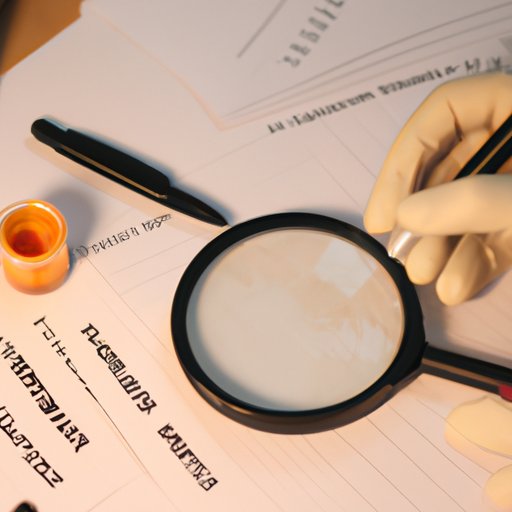Introduction
Forensic science is the application of scientific knowledge and techniques to investigate criminal activities. It is used to help law enforcement officers, lawyers, and judges understand the evidence presented in a court of law. Chemistry plays an important role in forensic science, as it is used to analyze evidence collected at a crime scene and to identify unknown substances. In this article, we will explore how chemistry is used in forensic science and how it helps solve crimes.
Exploring the Role of Chemistry in Forensic Science
Chemistry is an integral part of forensic science and is used to analyze evidence found at a crime scene. Chemical analysis is used to determine if a substance found at the scene is linked to the crime or not. By analyzing the chemical composition of a substance, forensic scientists can identify whether it is related to the crime or not. Additionally, chemical analysis can be used to compare two or more substances to determine if they are the same or not.
In addition to chemical analysis, there are other types of chemical tests that are used in forensics. These include chromatography, spectrophotometry, and mass spectrometry. Chromatography is used to separate mixtures of chemicals, while spectrophotometry is used to measure the amount of light absorbed by a sample. Mass spectrometry is used to analyze the mass of molecules in a sample. All of these methods are used to analyze evidence found at a crime scene.

Understanding How Chemistry Helps Solve Crimes
Chemistry is used to analyze trace evidence found at a crime scene. Trace evidence is any type of physical evidence that may be left behind during a crime, such as hair, fibers, glass fragments, paint chips, and soil samples. By analyzing the chemical composition of these items, forensic scientists can determine if they are linked to the crime or not. For example, paint chips found at a crime scene can be analyzed to determine the type of paint used and whether it matches paint found on a suspect’s clothing.
Chemistry is also used to examine fingerprints and DNA for clues. Fingerprints can be analyzed to determine the identity of a person who was at the crime scene. DNA analysis can be used to determine if a person is linked to the crime or not. Furthermore, chemistry can be applied to examine ballistics and firearms. Ballistics is the study of the motion of projectiles, such as bullets, and can be used to determine the weapon used in a crime.

Uncovering the Applications of Chemistry in Forensic Science
Chemistry is used to identify unknown substances found at a crime scene. This could include drugs, alcohol, explosives, or other hazardous materials. Forensic scientists can analyze the chemical composition of these substances and compare them to known substances to determine their identity. Additionally, chemistry can be used to investigate toxicology and poisonings. By analyzing the chemical composition of a substance, forensic scientists can determine if it is poisonous or not.
Finally, chemistry can be utilized for document analysis. Document analysis is the examination of documents, such as handwriting, typewriting, and printing, to determine their authenticity. Forensic scientists can use chemical tests to analyze documents and determine if they are genuine or not.
Conclusion
In conclusion, chemistry plays an important role in forensic science. It is used to analyze evidence found at a crime scene, examine fingerprints and DNA for clues, and apply chemistry to examine ballistics and firearms. Additionally, chemistry can be used to identify unknown substances, investigate toxicology and poisonings, and utilize chemistry for document analysis. Chemistry is invaluable in helping law enforcement officers solve crimes.
(Note: Is this article not meeting your expectations? Do you have knowledge or insights to share? Unlock new opportunities and expand your reach by joining our authors team. Click Registration to join us and share your expertise with our readers.)
